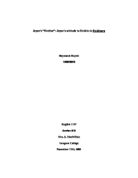She remembers the field in which she and others once played until a man from Belfast, colonial Britain at one remove, bought it and built houses on it. Ernest, her older brother, was too much older to join in their play and is now dead. Thus he joins that substantial Joycean company, already noticed, of dead or non- appearing brothers. As will later be described, this is a part of the Vopiscan theme (see Appendix).
The playmates, like those in 'Araby,' sheltered their play by vigilance against the inimical adult likely to interfere with and spoil their play, in this case Eveline's father. The fathers in these stories, sometimes called uncles to spare the sensibilities of Joyce's father (the suggestion is Ellmann's), are turbulent and oppressive drunkards but also on occasion kind and even playful and witty. Perhaps because Eveline is a daughter and not a son she can have a father instead of an uncle. Like John Joyce, Eveline's father became less capable as a part of the family after the death of his wife.
In the room where she stands she notes the picture of a priest, a school friend of her father. The priest, whose name she does not know, is the dwindled recollection of Father Flynn and of the nameless dead priest in 'Araby' and possibly (the suggestion is Tindall's) of Father Butler ('An Encounter') who was not at the Pigeon House. Eveline's priest has become a yellowing photograph the subject of which is now in Melbourne (see comments on this in 'Araby'). Next to his picture are the promises made to Blessed Mary Margaret Alacoque, a person who fascinated Joyce (cf. Finnegans Wake 214.23: "marthared mary allacook" and Ulysses 9.646: Buck Mulligan's "Blessed Margaret Mary Anycock"), perhaps because the extremity of her devotion makes her particularly repulsive to unregenerated susceptibilities. And also, as Robert Scholes points out, as a paralytic saint she is especially appropriate to the volitionally crippled Eveline .
Eveline considers her job as a department store clerk and her abusive superior. She will, she tells herself and the diction is very much Eveline's own, be a respected wife unlike her mother, now dead. She fears her father, a violent and uncontrolled man and she resents his parsimony. She herself is nineteen and there are two younger children, presumably siblings although the story is not clear about this, still at home.
She reminisces about Frank's courtship, his fight with her father who distrusted sailors. She has, regardless of everything, kind thoughts of her father as she thinks of him at his infrequent best. The sound of a street organ reminds her of the night that her mother died and how her father had paid a street organ player to move off and how he had cursed all foreigners. She sees her mother's life as a "life of commonplace sacrifices closing in final craziness." Her mother's last words, meaningless but seemingly Gaelic, were: "Derevaun Seraun! Derevaun Seraun!" Joyce passes over in silence the improbability that a Dublin woman of this time and class would know Gaelic.
Eveline experiences terror at what she perceives as her fate if she remains in Ireland. Frank will be her rescue.
In the short concluding part, despite her resolve and her knowledge, she rejects rescue and cannot board the ship. "All the seas of the world tumbled about her heart!" She dare not take risks and she gives Frank as he urges her to follow "no sign of love or farewell or recognition."
In this conclusion we can re-assemble Eveline and see how clichŽ-ridden and shallow is her description of her relationship with Frank and how superficial it is compared to her affection for place and family, even if that place is a home with dusty curtains and that family contains a frequently drunken and abusive father.
The story nowhere says that Frank went away without her. This gains great, if adventitious, interest from Ellmann's statement that the real life Eveline settled down with her sailor in Dublin and bore him many children.







